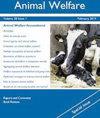Using a Delphi method to estimate the relevance of indicators for the assessment of shelter dog welfare
IF 2.3
4区 农林科学
Q2 VETERINARY SCIENCES
引用次数: 1
Abstract
The European regulatory framework lacks standardisation as regards the minimum requirements for shelter facilities, making defining welfare standards for dogs challenging. Dog (Canis familiaris) welfare assessments should consist of a comprehensive set of measurements that allow the calculation of an overall 'welfare score.' The Shelter Quality protocol was developed for the purpose of assessing shelter dog welfare. The study aims to establish a standardised system for evaluating shelter dog welfare by obtaining agreement from experts on the weighting of different measures contributing to an overall welfare score. The Delphi technique is a widely used method for establishing consensus among experts. Two Delphi procedures were implemented and we compared their effectiveness in achieving expert consensus by evaluating rounds' numbers required to reach consensus and the response and attrition rates. Expert consensus was achieved in Delphi 1 when the standard deviation in the expert weightings was ≤ 5. This was achieved easily for the welfare score weightings of the four principles: 'Good feeding', 'Good housing', 'Good Health', and 'Appropriate behaviour.' Animal-based measures were found to reach consensus more quickly than resource-based measures. In Delphi 2, we used the coefficient of variation to determine consensus. No statistical differences were found between the two Delphi methods for attrition rate, response rate or number of participants. Continuing rounds until a consensus is reached is recommended as this method balances time and participant fatigue. A standardised scoring system is provided, using a single overall score of welfare that can be used to compare welfare standards between shelters.采用德尔菲法对收容所犬福利评价指标的相关性进行估计
欧洲的监管框架在收容所设施的最低要求方面缺乏标准化,这使得确定狗的福利标准具有挑战性。狗(Canis familiaris)的福利评估应该包括一套全面的测量方法,以便计算出总体的“福利分数”。制定收容所质量协议的目的是评估收容所狗的福利。这项研究旨在建立一个标准化的系统来评估收容所狗的福利,通过获得专家对不同措施的权重的一致意见,从而形成一个整体的福利评分。德尔菲法是一种广泛应用于专家之间建立共识的方法。我们实施了两种德尔菲程序,并通过评估达成共识所需的轮数、响应率和损耗率来比较它们在达成专家共识方面的有效性。当专家权重的标准差≤5时,在德尔菲1中获得专家共识。这很容易实现的福利得分加权的四个原则:“良好的饮食”,“良好的住房”,“良好的健康”和“适当的行为”。研究发现,以动物为基础的措施比以资源为基础的措施更快达成共识。在德尔菲2中,我们使用变异系数来确定共识。两种德尔菲方法在流失率、反应率和参与者数量上没有统计学差异。建议继续进行轮次直到达成共识,因为这种方法可以平衡时间和参与者疲劳。提供了一个标准化的评分系统,使用单一的福利总分,可用于比较庇护所之间的福利标准。
本文章由计算机程序翻译,如有差异,请以英文原文为准。
求助全文
约1分钟内获得全文
求助全文
来源期刊

Animal Welfare
农林科学-动物学
CiteScore
2.30
自引率
8.30%
发文量
43
审稿时长
18-36 weeks
期刊介绍:
Animal Welfare is an international scientific and technical journal. It publishes the results of peer-reviewed scientific research, technical studies and reviews relating to the welfare of kept animals (eg on farms, in laboratories, zoos and as companions) and of those in the wild whose welfare is compromised by human activities. Papers on related ethical, social, and legal issues and interdisciplinary papers will also be considered for publication. Studies that are derivative or which replicate existing publications will only be considered if they are adequately justified.
Papers will only be considered if they bring new knowledge (for research papers), new perspectives (for reviews) or develop new techniques. Papers must have the potential to improve animal welfare, and the way in which they achieve this, or are likely to do so, must be clearly specified in the section on Animal welfare implications.
 求助内容:
求助内容: 应助结果提醒方式:
应助结果提醒方式:


